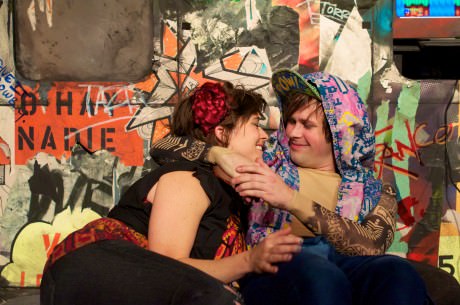
Picture a world where the rules are constantly changing and if you can’t keep up you slip through the cracks of society into something altogether undetermined. Polyglot America— where Latin and South have joined equal power rankings with North and the urban street scene is where the action thrives; every person living for their next fix, their next high. Arcades, hookers, drugs, the challenges of maintaining hope in a world deconstructed and destroyed where the only prevailing beam of light that filters through it the chance of true love; that is what springs to life in Single Carrot Theatre’s production of Caridad Svitch’s The Tropic Of X.
Directed by Nathan A. Cooper, the production is the epitome of the theatre’s mission—a new socially significant work that creates a vibrant theatrical experience. The story is both edgy and artistic leaving drastic gaps for interpretation and can be difficult to follow at the best of times. With only five performers, one of whom is an overarching narrative eye of sorts, the show follows a rapid pace, keeping time with the ever changing society of the story’s backdrop.
Scenic Designer Lisi Stoessel captures the essence of an urban ghetto in her towered structure leaving the play space wide open for a plethora of activity to occur. The tower to the right that serves in duality as a place to hide the live stage musician and as a broadcasting tower for the DJ, is shadowed, thematically reflecting the way the lay of the law is ever present as is the soundtrack of our reality. Stoessel tags a mural of graffiti on the other tower with boxes of hidden lights for accents. Her simplistically complex design gives the audience a feel for the atmosphere for the play without bogging down the set in heavy furnishings.
Sound Designer Steven Krigel uses electronic sound influences in his design to keep the pace of the show raging; many of the scenes underscored with a heavy pulse radiating from the hidden musician, Jeremy Durkin. Working together with Durkin, Krigel highlights the urban streetscape and the edgier moments of life in an ever-changing society with his designs, balanced perfectly against the text and dialogue of this play.

Cooper’s approach to this production leaves a good deal open for debate, leaving the audience questioning and thinking about the story and the ideas entwined within its lines. The story itself plays with gender roles in this futuristic society, man can become woman and woman can become man. In some places Cooper defines this more clearly with costume changes, in others he dabbles in the gray areas of uncertainty, like choosing to cast a female dressed as a female who is really a male in drag. There are moments of interpretive movement that fit the piece, during the poetic reading at the end, and moments that feel slightly off-kilter in the bizarre moments, like the strange dancing that occurs during the attack on the foreigner. Cooper presents a drama ripe with questionable moments, but they do make you think.
DJ Hilton (Aldo Pantoja) who is removed from the story despite playing a critical role in the concept of the play becomes the eyes of the world. Pantoja spends the performance atop the tower ‘broadcasting’ now and again, between scenes and occasionally during them. He acts as they eyes and the mouthpiece of the futuristic regimes as they change. Pantoja rattles through the text like he’s rapping poetry, playing with vocal devices such as speech patterning, pitch and volume to accentuate certain words over others. It is a unique approach to a narrator; a modern callback to the notion of the Greek chorus being solidified into one ever-present voice.
Playing a series of men, though only ever identified as Fabian, is Paul Diem. Initially a tourist he is proved to be no better than the rest of those that live on the street as he is seeking his next rush of adrenaline, finding it and taking it when he can. Diem’s approach to the character is cold, which works perfectly in instances where he becomes an authority figure. His interactions with Mori are stoic and stalwart at the best of times, his anger translated in his stiff stature and his tight-pressed words.The controversial character of the hour is Kiki (Jessica Garrett). Playing a drag queen who is just trying to keep clean Garrett exudes a sexual confidence that carries from the high-strut she walks to the smart tongue she uses to talk. Her emotions are consistently raw; exposed in their baser format, giving new meaning to the phrase she wears her heart on her sleeve. Her street savvy tussles with Maura provide provocative entertainment. Garrett brings a presence to the character that may not have been achieved by simply staging a man in drag, more thoroughly bending the concepts of gender in her performance.

The focus of the production revolves around the waning hope for true love between Mori (Nathan Fulton) and Maura (Genevieve DeMahy). Thick as thieves with constant quarrels a tempestuous love brews between them, tucked away deep beneath the surface of their rough exteriors. Both characters are guarded individuals who relate on a subconscious level; neither fully able to express themselves or admit to themselves that there is true love until it’s too late. This dawning realization sends both Fulton and DeMahy on a quest across time to find one another, defying gender boundaries in the process—Fulton transforming from a boy of the streets into a broken girl and DeMahy from a rough gritty female into a shy and demure boy.
Their portrayals in these roles are relatively mind-blowing— the transformations from the volatile exteriors, coarse and boorish, to the subdued and broken people that they become; watching such a feat is fluid poetry in motion, DeMahy and Fulton’s bodies the vessels for such messages to translate to the audience.
It’s a little bizarre, but it wouldn’t be a Single Carrot production if it wasn’t and it does leave you with a lot of questions, many regarding society and the hope of the future; well worth a look if you’re up for the mental challenge.
Running Time: Approximately 90 minutes, with no intermission.
The Tropic of X plays through March 3, 2013 at Single Carrot Theatre — 1727 North Charles Street in Baltimore, MD. For tickets call (443) 844-9253, or purchase them online.




